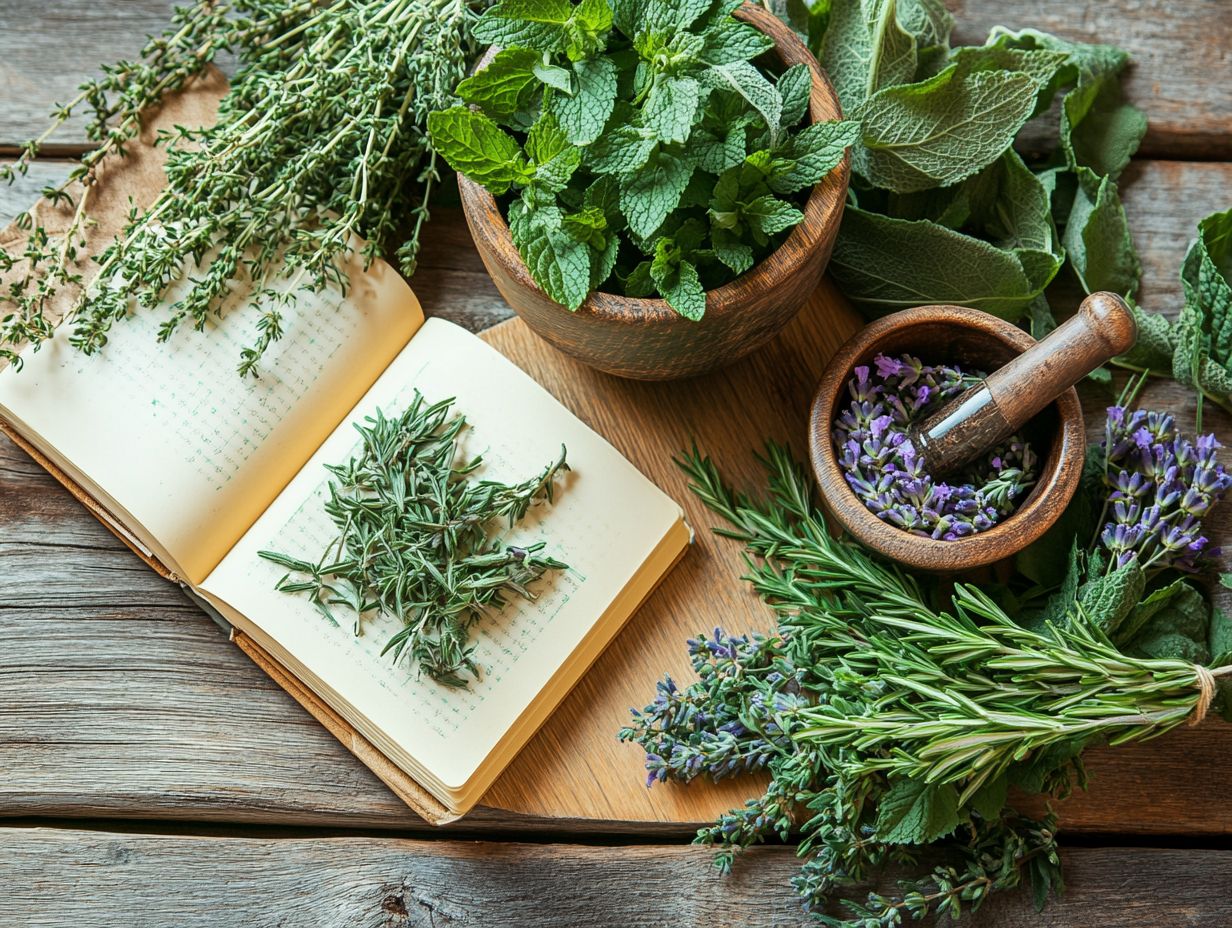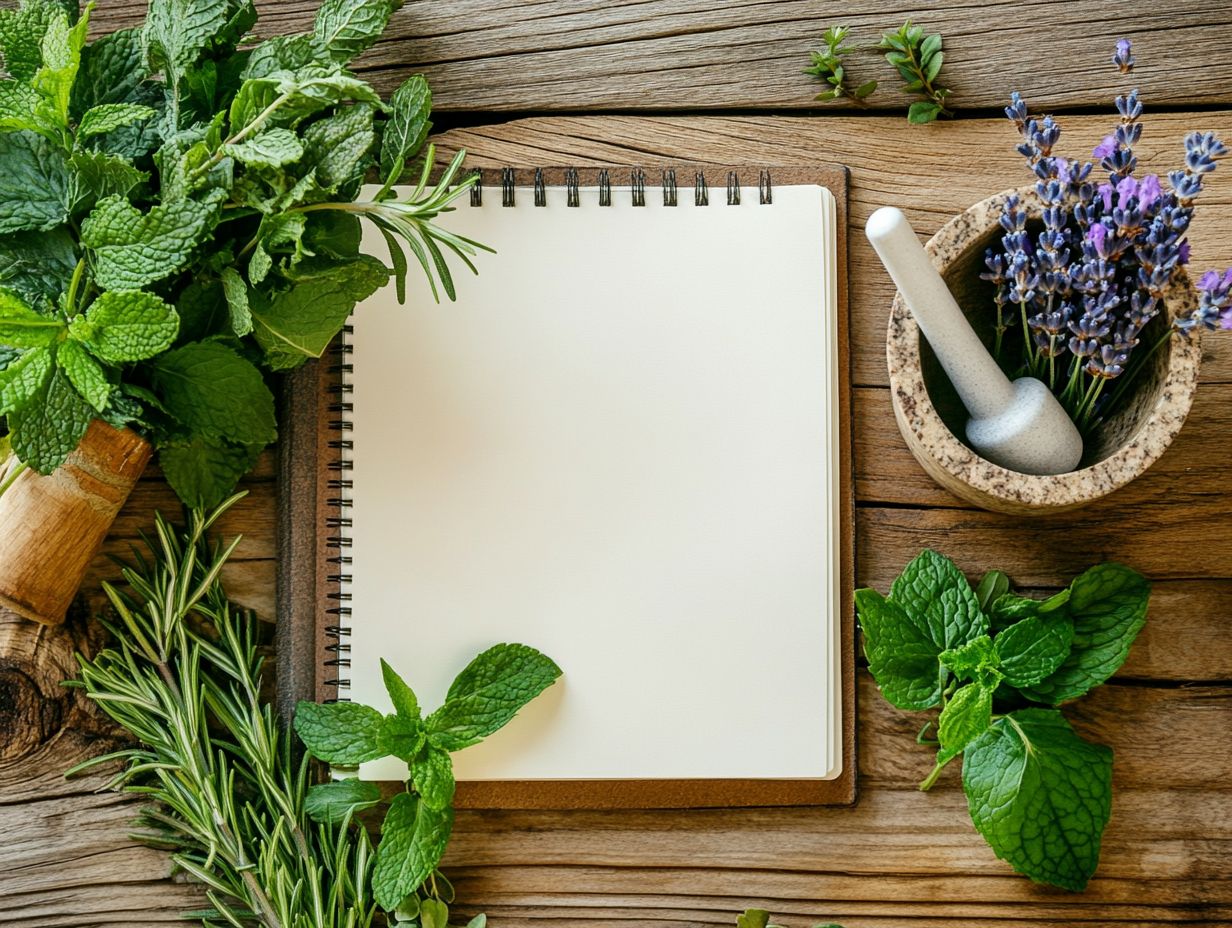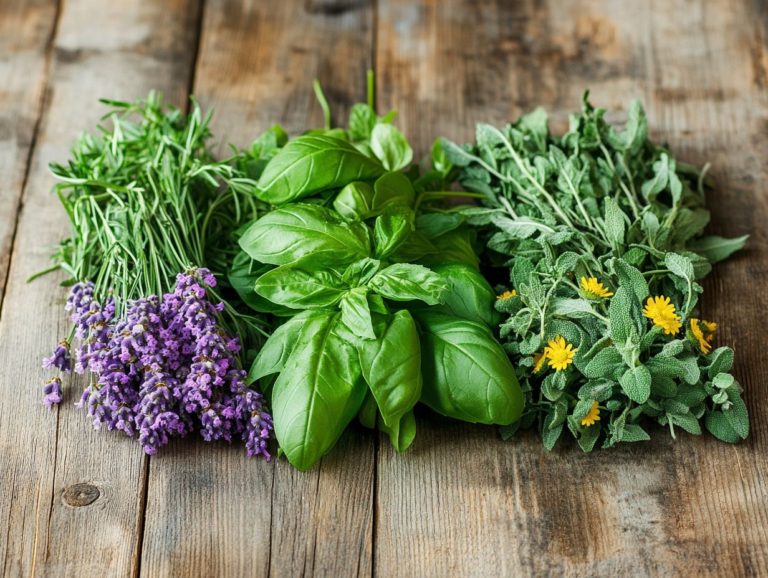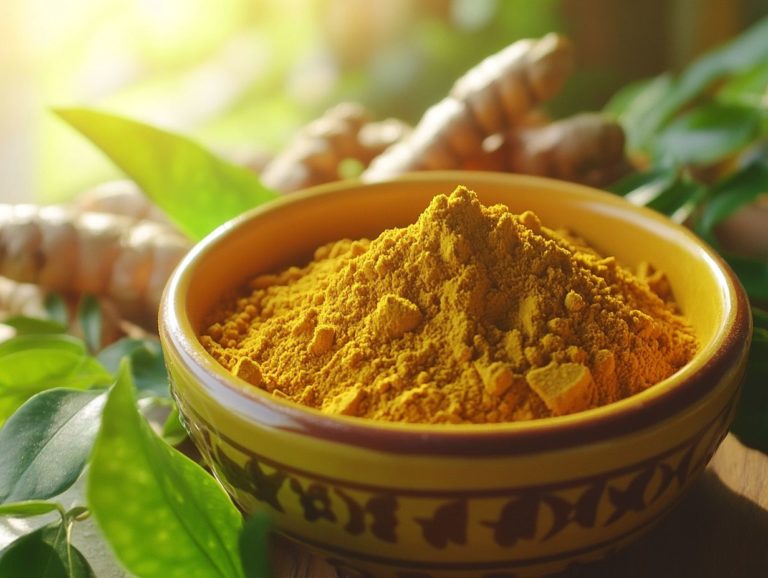The Science Behind Herbal Remedies
Herbal remedies have long stood as a cornerstone of health and healing. They are woven into countless cultures across the globe.
This article explores the world of herbal remedies. It delves into their historical significance and how they work in the body.
You will examine popular herbs, their uses, and essential safety tips. Whether you want to use herbs for health or simply learn more, this guide will provide valuable insights.
Contents
Key Takeaways:

Herbal remedies have been used for centuries for their healing properties. They show positive effects on various health conditions, although their exact mechanisms are still being studied.
When using herbal remedies, weigh the potential risks against the benefits. It is crucial to use them safely and effectively.
Understanding Herbal Remedies
Herbal remedies are gaining recognition as effective alternatives to conventional medicines. They draw from ancient practices that highlight the healing properties of plants.
These plant-based products range from herbal supplements to dried herbs. For centuries, they have been used to address health issues and improve well-being.
Whether it’s a calming cup of herbal tea or a skin gel, herbal preparations support holistic therapy. They help maintain balance in the body.
Learning about herbal medicine enriches your health approach. It empowers you to make informed wellness decisions.
What are Herbal Remedies?
Herbal remedies are natural solutions derived from plants. They aim to promote health and tackle various ailments.
These remedies come in many forms, including teas, capsules, extracts, and tinctures. For instance, Echinacea boosts the immune system and helps prevent colds.
Ginkgo biloba is known for enhancing brain function and improving circulation. Practitioners highlight the holistic benefits of these herbs for balanced health.
History and Cultural Significance
The history of herbal remedies is rich and diverse. Many cultures have relied on these practices for healing over the centuries.
Traditional systems like Ayurvedic medicine and Chinese herbalism have been essential in maintaining health. These ancient practices lead to modern studies of natural medicines.
Understanding their cultural significance enhances your appreciation for herbal therapy today.
Role of Herbal Remedies in Different Cultures
Herbal remedies play a vital role in various cultures. They form the foundation of traditional medicine systems focused on natural healing.
In many societies, these practices connect to historical beliefs and customs. Ayurveda uses herbs tailored to individual needs for a holistic health approach.
Indigenous cultures, like Native American and Chinese traditions, also utilize plants for healing. This respect for nature enriches our understanding of herbal remedies.
How Herbal Remedies Work

Herbal remedies work through active ingredients that interact with your body s systems. This fosters healing and overall well-being.
The realm of herbal chemistry unveils how these plant medicines, sourced from medicinal herbs, impact various health conditions. They work by restoring balance and promoting homeostasis.
By understanding the mechanisms behind herbal therapy, you can make informed decisions about incorporating these natural solutions into your health regimen. This ensures their effectiveness and safety are maximized.
Mechanisms and Effects on the Body
The mechanisms and effects of herbal remedies on your body are intricate. They often address specific health issues like immune system deficiencies and cardiovascular conditions.
These natural treatments influence bodily functions through various pathways. They may provide support in ways that mainstream pharmaceuticals might not achieve.
Take turmeric, for instance. It contains curcumin, which is renowned for its potent anti-inflammatory properties. Curcumin can alleviate chronic pain and inflammation by inhibiting pro-inflammatory cytokines.
Similarly, ginger offers antioxidant benefits that combat oxidative stress, promoting better overall health.
Echinacea is a powerful ally. It is frequently used to enhance immunity and ward off colds and flu by increasing the number of white blood cells.
Recognizing these powerful plants can transform your approach to health. You can blend traditional wisdom with scientific insight for effective wellness strategies.
Common Types of Herbal Remedies
Common types of herbal remedies include herbal supplements, herbal teas, dried herbs, and concentrated extracts. Each presents distinctive benefits to address a range of health needs.
These plant-based products offer natural alternatives for managing health conditions or enhancing overall wellness.
For example, herbal teas derived from ginseng or St. John’s Wort may promote relaxation. Concentrated extracts provide potent doses of active ingredients designed for targeted effects.
By understanding the diversity of herbal preparations, you can make informed choices that align with your specific health requirements.
Overview of Popular Herbs and Their Uses
Popular herbs like Echinacea, Ginkgo biloba, and Ginseng have been extensively studied for their remarkable medicinal properties. Each offers distinctive benefits tailored to various health conditions.
These herbs have been integral to traditional healing practices for centuries. They serve as cornerstones in holistic medicine aimed at fostering overall wellness.
Echinacea, known for its immune-boosting prowess, is a popular choice for combating colds and respiratory infections. Active compounds such as echinacoside have shown promise in clinical studies, making it a reliable ally in your health journey.
Ginkgo biloba is celebrated for its ability to enhance cognitive function and improve circulation. Its potent flavonoids and terpenoids have garnered research backing that highlights improvements in memory and concentration definitely worth considering if you re looking to sharpen your mental edge.
Meanwhile, Ginseng stands out for its adaptogenic qualities. It helps your body manage stress and fatigue. Scientific evidence suggests it s effective in boosting physical endurance and energy levels, making it an excellent choice for those busy days when you need that extra push.
Safety and Effectiveness of Herbal Remedies
The safety and effectiveness of herbal remedies are paramount for anyone exploring natural alternatives to prescription and over-the-counter medications.
While numerous herbal products can provide therapeutic benefits, it s essential to assess their safety profiles, clinical trials, and quality certifications for responsible use.
Regulatory bodies like the FDA monitor these products. However, it s equally important for you to research herbal product labels and claims. This diligence will enable you to make informed choices about your health.
Explore these natural solutions and discover how they can enhance your life!
Evaluating Risks and Benefits

Evaluating the risks and benefits of herbal remedies is crucial for making informed decisions about their role in your health management.
This process involves a thorough examination of potential allergens and toxic constituents that could adversely affect your well-being.
It’s important to consider possible interactions between herbal products and conventional medications, as combining these can sometimes lead to unexpected complications or diminish their therapeutic effects.
Consulting with a healthcare provider before starting any new herbal treatment is essential. This helps you get advice tailored to your health, including your unique history, existing conditions, and current medications.
Take charge of your health by prioritizing safety when exploring alternative treatments to enhance your wellness.
Incorporating Herbal Remedies into Your Health Routine
Incorporating herbal remedies into your health routine can offer significant support for your overall wellness. However, it’s essential to approach this with careful consideration regarding dosage, quality, and your unique health needs.
Tips for Safe and Effective Use
To ensure a safe and effective experience with herbal remedies, prioritize quality, consult with a healthcare provider, and adhere to recommended dosages.
Beyond these essential steps, it s vital to familiarize yourself with the specific effects of the herbs you plan to use.
Keeping a detailed health journal can be immensely helpful in monitoring your responses and spotting any changes in your well-being.
Being aware of potential side effects is crucial; take the time to research or ask about any adverse reactions associated with your chosen remedies.
Always source your products from reputable suppliers to guarantee quality assurance, as this significantly impacts both efficacy and safety.
By embracing a mindful and informed approach to herbal consumption, you empower yourself on your wellness journey.
Frequently Asked Questions
Here are some common questions about herbal remedies you may find helpful:
What is the science behind herbal remedies?
The science behind herbal remedies is the study and understanding of the chemical components, effects, and how they work in your body. It involves a combination of traditional knowledge, modern research, and scientific methods to validate the efficacy and safety of herbal remedies.
How do herbal remedies work?

Herbal remedies work by utilizing the chemical compounds present in plants to produce a therapeutic effect in the body. These compounds can interact with various receptors and enzymes, leading to changes in biochemical processes and resulting in a desired health benefit.
Are herbal remedies safe to use?
In general, herbal remedies are considered safe to use when taken correctly and in recommended doses. However, it is important to note that not all herbal remedies are regulated by the FDA, and some may interact with certain medications or have potential side effects.
It is always best to consult with a healthcare professional before using herbal remedies, especially if you have any pre-existing medical conditions or are taking any medications.
Why do people choose herbal remedies over conventional medicine?
There are various reasons why people may choose herbal remedies over conventional medicine. Some may prefer a more natural and holistic approach to healing, while others may have had negative experiences with traditional medication.
Some herbal remedies are often more affordable and easier to find than prescription drugs.
Can herbal remedies cure diseases?
Herbal remedies are not meant to replace conventional medicine and are not a cure for diseases. However, they can be used as complementary or alternative treatments to manage symptoms and improve overall well-being.
It is important to consult with a healthcare professional for proper diagnosis and treatment of any medical condition.
Are there any potential risks associated with herbal remedies?
Herbal remedies can pose some risks. These include allergic reactions, medication interactions, and side effects like nausea, diarrhea, and headaches.
Always research thoroughly. Talk to your doctor before using any herbal remedy to stay safe!






